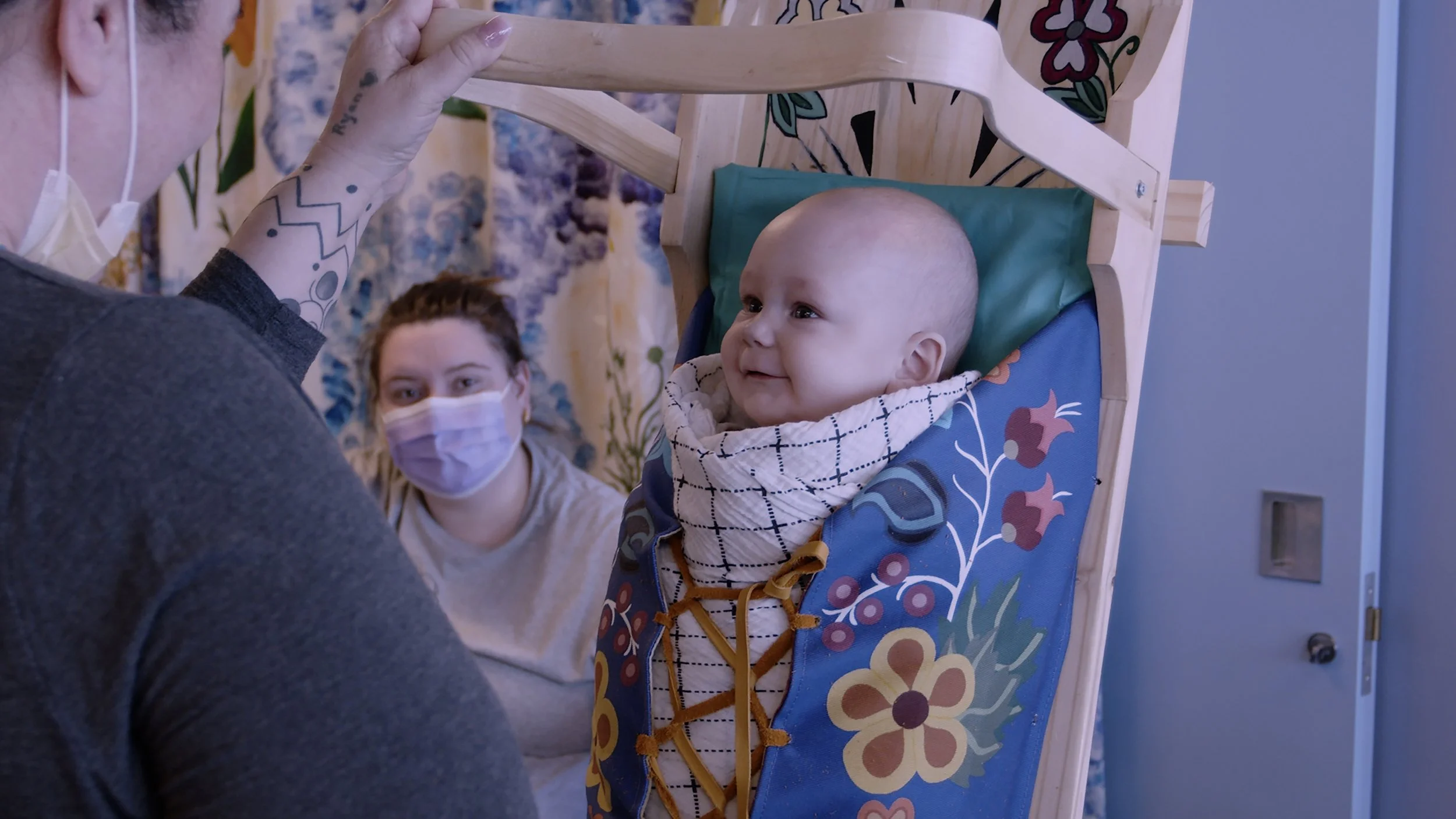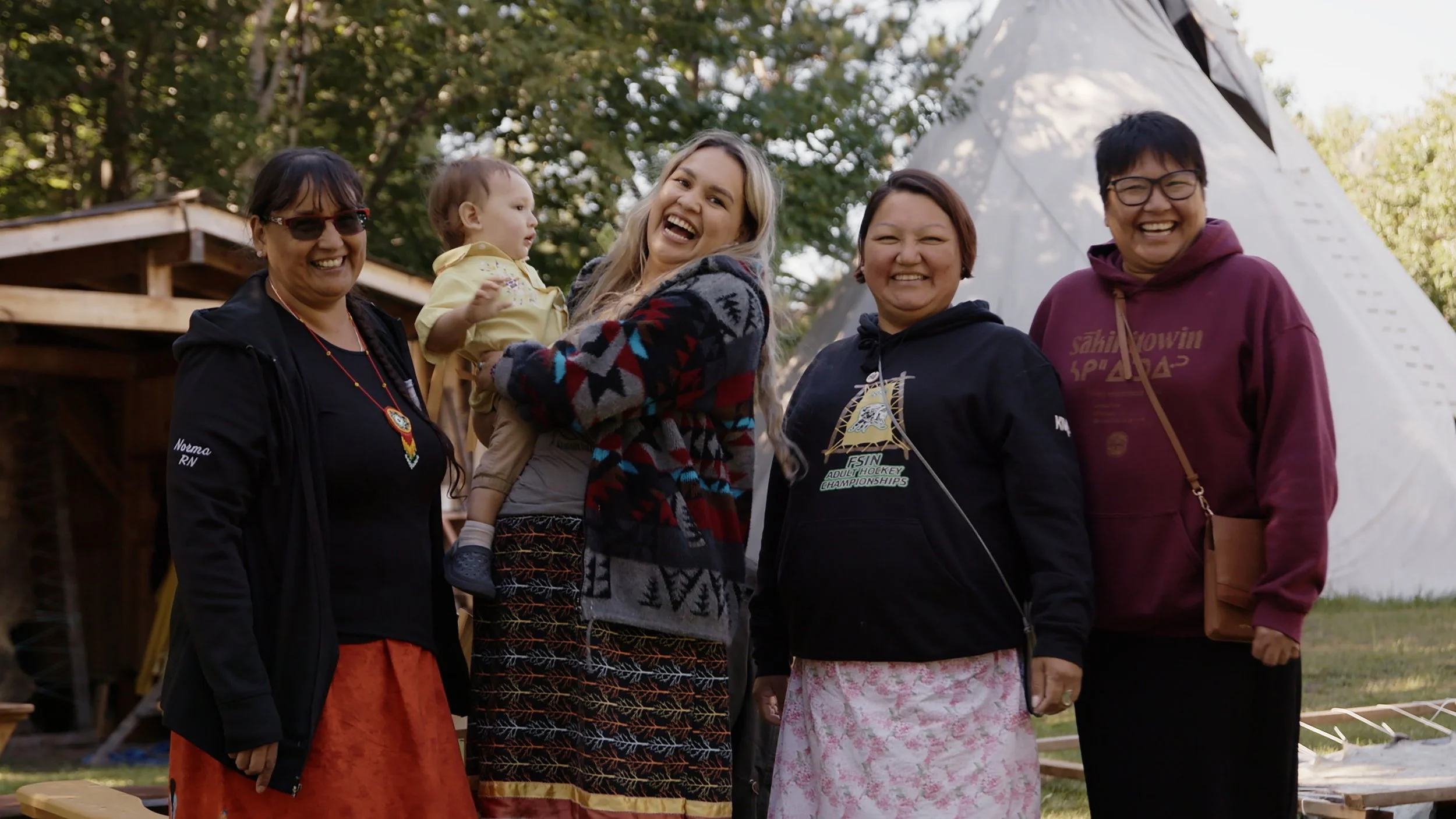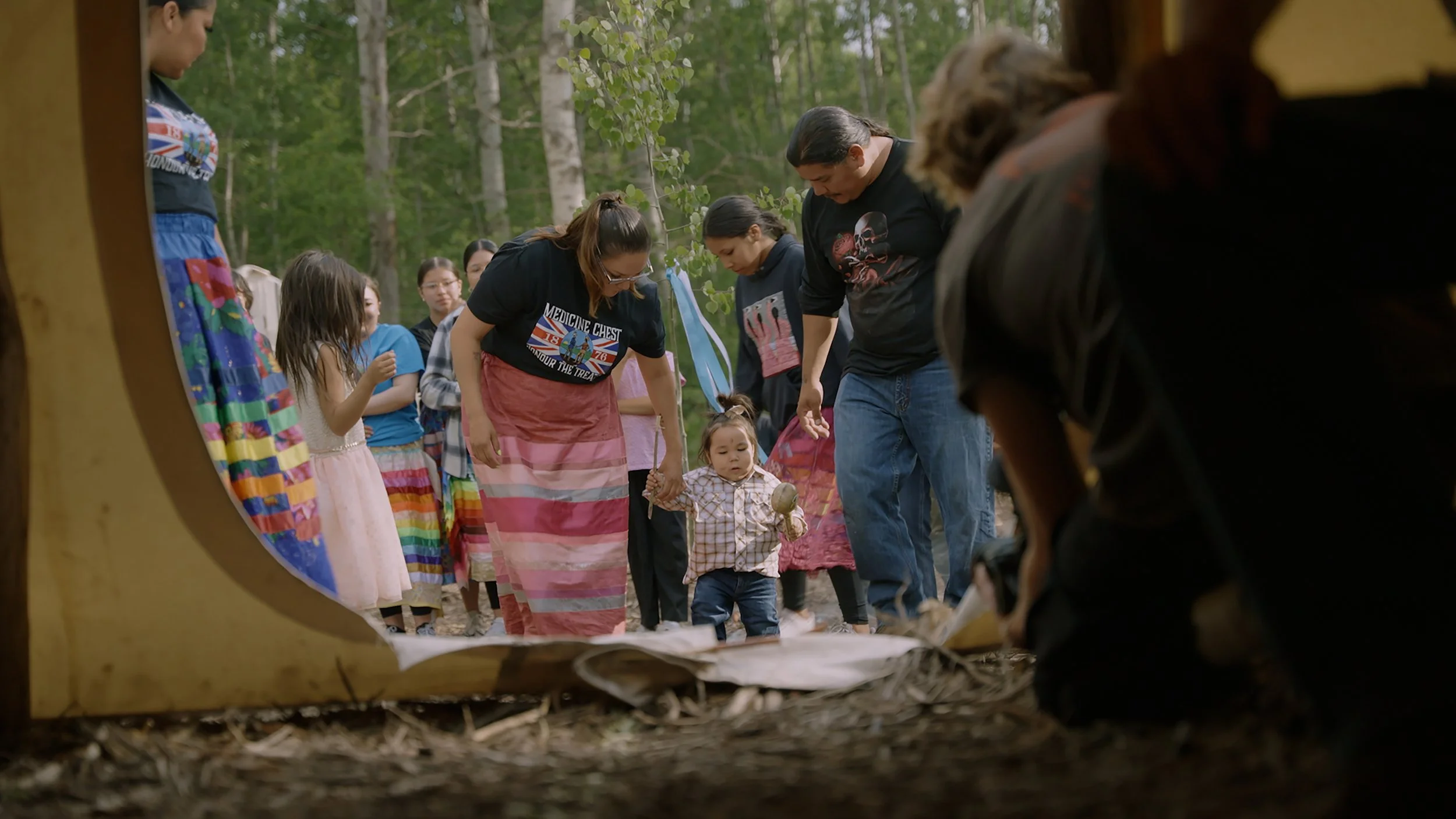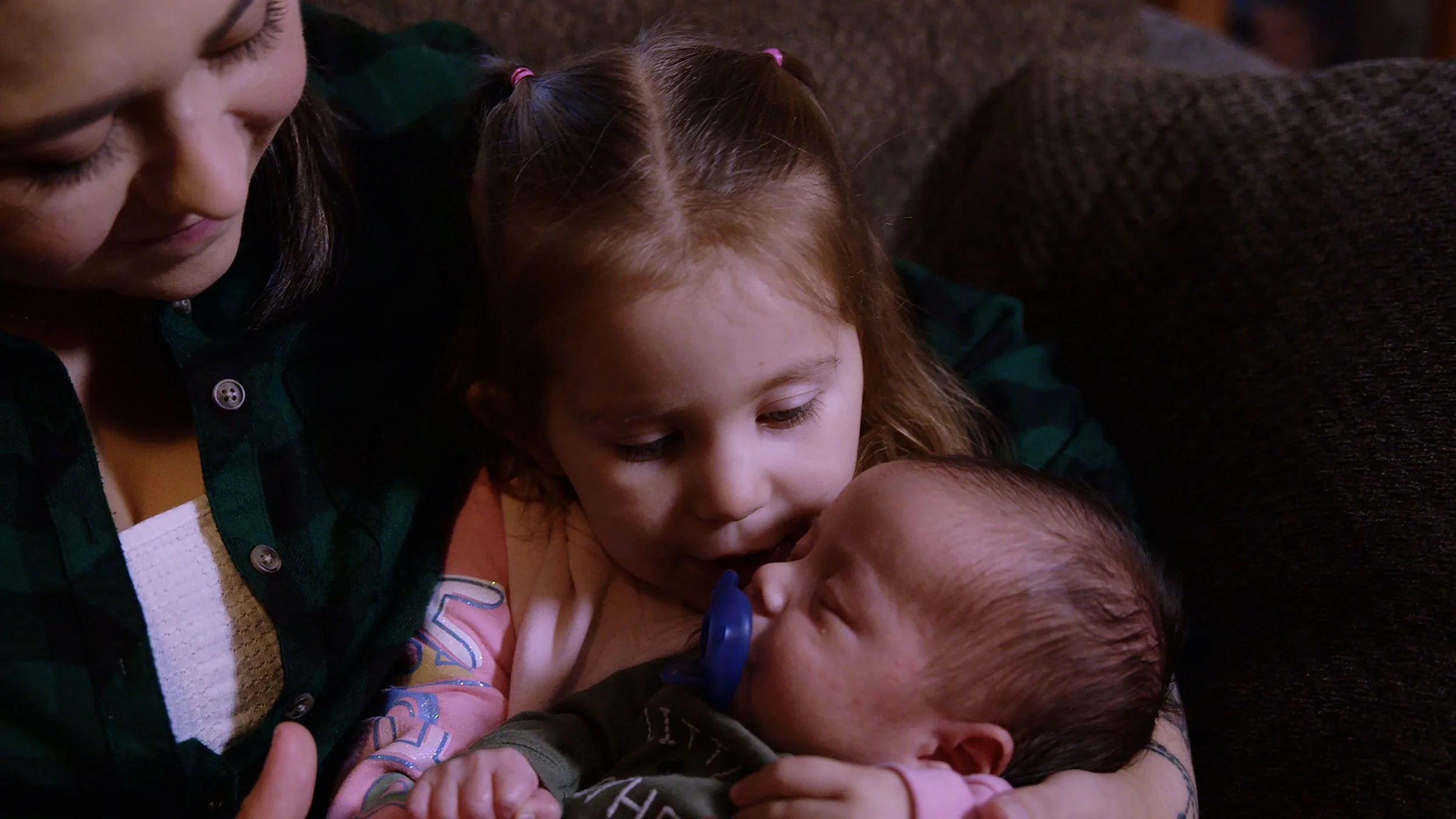Spirit of Birth
Spirit of Birth
LIMITED DOCUMENTARY SERIES 🔴 8EPSx30MINS 🔴 ENGLISH
https://spiritofbirth.ca/home/
An Anishinabe mother reclaims traditional Indigenous birthing practices across Canada, hosted by Rebeka Tabobondung.
Inspired by her personal experience of motherhood, SPIRIT OF BIRTH host, Rebeka Tabobondung (Anishinaabe), embarks upon a journey to Indigenous communities across Canada, and into the sacred world of Indigenous midwives and birth workers as they care for pregnant mothers and families in order to restore birth in their communities.
For generations, Indigenous birth knowledge and practices have been silenced by colonization, the forced residential school system, and the removal of birth from communities. Today Indigenous midwives are reclaiming their sacred roles as leaders and nation builders, deeply committed to ensuring the protection and growth of our communities most sacred gifts: our children.
Rebeka’s journey shines a light on a movement happening across Turtle Island (Canada) to bring birth back to communities. Both ancient and new midwifery practices are being embraced by many communities and their allies who work to heal and restore health, cultural traditions and identity. Dedicated midwives and knowledge keepers are protecting and re-establishing Indigenous midwifery within their nations - yet the challenges and stakes are very real and space for culturally-grounded care must be made for birth knowledge and traditions not to be lost—and Rebeka is eager to learn.
From the large, diverse, urban Indigenous community of Seven Generations Midwives Toronto (SGMT), to Six Nations of the Grand River (the biggest Haudenosaunee community in Canada), to the powerful Anishnaabe community of Nipissing in Northeastern Ontario, to Kehewin Cree Nation in Alberta, and the northern Cree community of Chisasibi in James Bay Quebec—SPIRIT OF BIRTHgets up close and personal with midwives, birth helpers, Elders, and families. SPIRIT OF BIRTH opens a rare, insightful window into the often private and always sacred ceremony of birth—while also telling a universal story.
Canadian Broadcast Premiere: Coming Soon to APTN Lumi
SPIRIT OF BIRTH is an intimate docuseries with Anishinabe mother and host, Rebeka Tabobondung, bringing us on a journey to the Indigenous midwives, birth workers, and families who are restoring midwifery and birth practices within their communities.
INDIGENOUS MIDWIFERY
“Not too long ago every life in the community was touched by the midwife
as she was the one who guided women through the most difficult
and rewarding work of giving birth.”
— Rebeka Tabobondung, Wasauksing First Nation
What is a midwife? Midwives are women-centered health care providers – they support the decisions that women and families they care for feel work best for them based on informed choice. Midwives are experts at low-risk pregnancy and nor- mal birth. In Canada, midwives are regulated health care providers who care for healthy women and their newborn babies from early pregnancy, through labour and birth, until about 6 weeks postpartum.
Indigenous Midwives were central in maintaining the life and connections of life within the community and were very respected. From the earliest points of contact, processes of colonization attempted to destroy Indigenous midwifery and birth knowledge. This resulted in the separation of the midwife from the birthing process; the deterioration of the ties between a woman and her midwife, husband, children, community; the birth of children outside traditional areas; and the breakdown of the rites of passage (for example: name giving ceremonies). Indigenous oral traditions, which had been used to ensure the passage of community birth knowledge from one generation to the next, were greatly diminished.
Thankfully, many Indigenous grandmothers, great-grandmothers, and midwives worked to protect our birth knowledge and practices which went underground. These extraordinary acts of resistance and resilience to protect Indigenous birth knowledge have enabled a resurgence of Indigenous midwifery traditions largely driven by demand from a new generation of young families seeking access to re-engage our traditional practices. Today, Indigenous midwives are re-constructing the central role they have played in their communities since time immemorial. The result is increased access to quality care – with quality defined by the terms of Indigenous communities. This in turn leads to more positive birth experiences and healing from the negative impacts of colonization in communities.
COMMUNITIES featured in sPIRIT OF bIRTH:
Creator and director Rebeka Tabobondung has been working closely with Seventh Generation Midwives Toronto (SGMT) for over 14 years and she also has established relationships in Six Nations, as well as in Nipissing where the K’Tigaaning Midwives are located. The James Bay Cree Community of Chisasibi is the home of Ernest Webb who is the co-founder of Rezolution Pictures and also the executive producer of the Spirit of Birth series.
SEVENTH GENERATIONS MIDWIVES (SGMT)
TORONTO, ON
Seventh Generation Midwives Toronto (SGMT) is a group of primary caregivers that includes 17 midwives who provide high quality maternity care to women and their families from the City of Toronto, particularly those from the downtown area, and from the Indigenous community. SGMT is an urban practice with high Indigenous birth numbers; approximately 80,000 Indigenous people live in the greater Toronto area (GTA). SGMT services a diversity of Indigenous nations and families as well as an established two-spirit community. From supporting families facing poverty, navigating child welfare systems, to executive level Indigenous professionals, SGMT includes Indigenous cultural and birthing traditions in their approach. SGMT provides care throughout pregnancy, labour, birth and the first 6 weeks postpartum, taking into account the spiritual, emotional, mental and physical experiences of the woman during her childbearing year including pre-and postnatal support grounded in cultural activities. Since it opened its doors, SGMT has been bursting with growth and interest from the Indigenous community who are looking to re-engage their cultural knowledge and safety.
In 2011, SGMT established the Toronto Birth Centre (which is open to all women to access in Toronto) and established their clinic alongside the unique downtown location in Regent Park. The Toronto Birth Centre was designed by Indigenous midwives and has incorporated the artwork of famed Christi Belcourt as well as unique Indigenous values design elements such as water pools, fire, and stone into every birth room. This positive space would be in direct contrast to common feelings of dislocation often associated with urban Aboriginal life in the city.
Related Links
CHISASIBI MIDWIFERY PROGRAM
NORTHERN JAMES BAY CREE TERRITORY, QC
Until September 2018, 100% of the pregnant women in Chisasibi were flown out of the community on a Medevac plane to give birth in a hospital usually in Val-d’Or over 1000 kilometers from home – often alone without any family to support them. Due to the grit and determination of Indigenous and non-Indigenous midwives, healthcare professionals, families, and community members, today that number has dropped to 50%. In Chisasibi, as throughout James Bay, the situation came to the point where the people would not take it anymore and formed a midwifery-working group supported by the Cree Health Board to bring birthing back to the territory and the land of Eeyou/ Eenou Istchee.
Since September 2018, women can now choose to have their babies in Chisasibi, the largest Cree community in the region and the only one with a hospital/birth centre, rather than down south. Eeyou/Eenou Elders have identified the newly launched mid-wifery program of the Nishiiyuu Waapimaausuwin services as critical to Cree identity, resilience, and health and to sustain that life through birth. It focuses on the meaning of being born and spirit to restore something that was there before: the knowledge developed by the Eeyou/Eenou is known to foster good health for women and babies.
The midwifery program is in high demand, with midwives now caring for almost half of Chisasibi pregnancies, or about 25 women. The community’s population is about 5,000 and growing quickly. There are currently four midwives working in the program, all of whom are non-Indigenous. They are making efforts to train Cree midwives and doulas who will take up the reins of midwifery in the region. In the meantime, the midwives are learning, through recognized Cree trainers, how to incorporate Cree birthing traditions into their practice.
Related Links
SI NON:WE IONNAKERATSTHA ONA:GRAHSTA
SIX NATIONS OF THE GRANT RIVER, ON
Six Nations of the Grand River is the largest First Nation reserve in Canada. As of the end of 2017, it has a total of 27,276 members, 12,848 of whom live on the reserve. It is the only reserve in North America that has representatives of all six Iroquois nations living together: Mohawk, Cayuga, Onondaga, Oneida, Seneca and Tuscarora. Some Lenape also live in the territory. The community of Six Nations of the Grand River decided that the birthing process had to be returned to the families. In 1995 funding was secured and a family home on Sour Springs Road was purchased to renovate for the Maternal and Child Centre and the Tsi Non:We Ionnakeratstha Ona:Grahasta was born. The midwives provide a balance of traditional and contemporary midwifery services and programs. There is also an Elders Council that includes clan mothers who provide spiritual/cultural direction and guidance. The Centre also offers a midwifery-training program and we will follow some of the trainees as they learn how to become a mid- wife. Many of the midwives in Six Nations operate through the Aboriginal exemption clause, meaning they can only practice midwifery on reserve but still provide support if they have to accompany their client to a hospital birth off the reserve.
Related Links
K’TIGAANING MIDWIVES
NIPISSING, ON
Nipissing First Nation, pop. 1450 is a community of the Anishinaabe peoples, which includes the Odawa, Ojibwe, Potawatomi, and Algonquins located just west of North Bay along the shorelines of Lake Nipissing in northern Ontario. In 2016, mother daughter team, Carol Couchie and Rachel Dennis established K’Tigaaning Midwives.
K’Tigaaning is an Anishinaabemowin word, which translates to “In the Garden.” In a garden, we came and in a garden – we grow. Midwives work with pregnant people who are cultivating new life within them that will change their life path forever, expand their families and help build their communities. Their mission is to provide quality medical midwifery care, support and guidance to pregnant people, their families, and communities in a safe and culturally appropriate setting open to traditional teachings and ceremonies. “We honour and incorporate local Indigenous knowledge in relation to the spiritual, emotional, mental and physical experiences of people during their childbearing year.”
Their practice serves a smaller population of Indigenous people but is open to all. Their size means they are able to operate outside of a large bureaucracy. In addition to providing midwifery care, they provide culturally grounded baby wellness programs as well as a beautiful birthing room with a large birth pool.
Related Links
KEHEWIN CREE NATION
The Kehewin Cree Nation (Cree: ᑭᐦᐁᐤ ᓀᐦᐃᔭᐤ ᐊᐢᑭᐩ, kihêw nehiyaw askiy) is a First Nations band government in northern Alberta. A signatory to Treaty 6, it controls one Indian reserve, Kehewin 123, and shares ownership of another, Blue Quills.
Related Links
WASAUKSING FIRST NATION
Our community, Wasauksing First Nation, is located on a beautiful island in Mnidoo-gamii (Georgian Bay) and borders the municipality of Parry Sound and Seguin Township.
The Island has year-round road access to the mainland via the Wasauksing Swing Bridge that connects to Rose Point in Seguin Township. Our surveyed akii (lands) encompasses majority of Parry Island, with the exception of Salt’s Point in the northeast. Waaseyakosing, (Place that shines brightly in the reflection of the sacred light), also known as the Parry Sound region, has been an important geographical and spiritual location for Indigenous people for time immemorial. The Indigenous people first came to the shores of Mnidoo-gamii (The Great Lake of the Spirit), or Georgian Bay, during a great travel from the waabanong (east). Many of the Indigenous travellers settled to protect others on their travels from attacks from the zhawanoong by the Haudenosaunee, while others continued their travels giiwedin (north) and ningaabiian (west). Due to its navigable waterways, rich local hunting grounds, and spiritual significance, the region became an important hub for the Anishinaabek.
Related Links
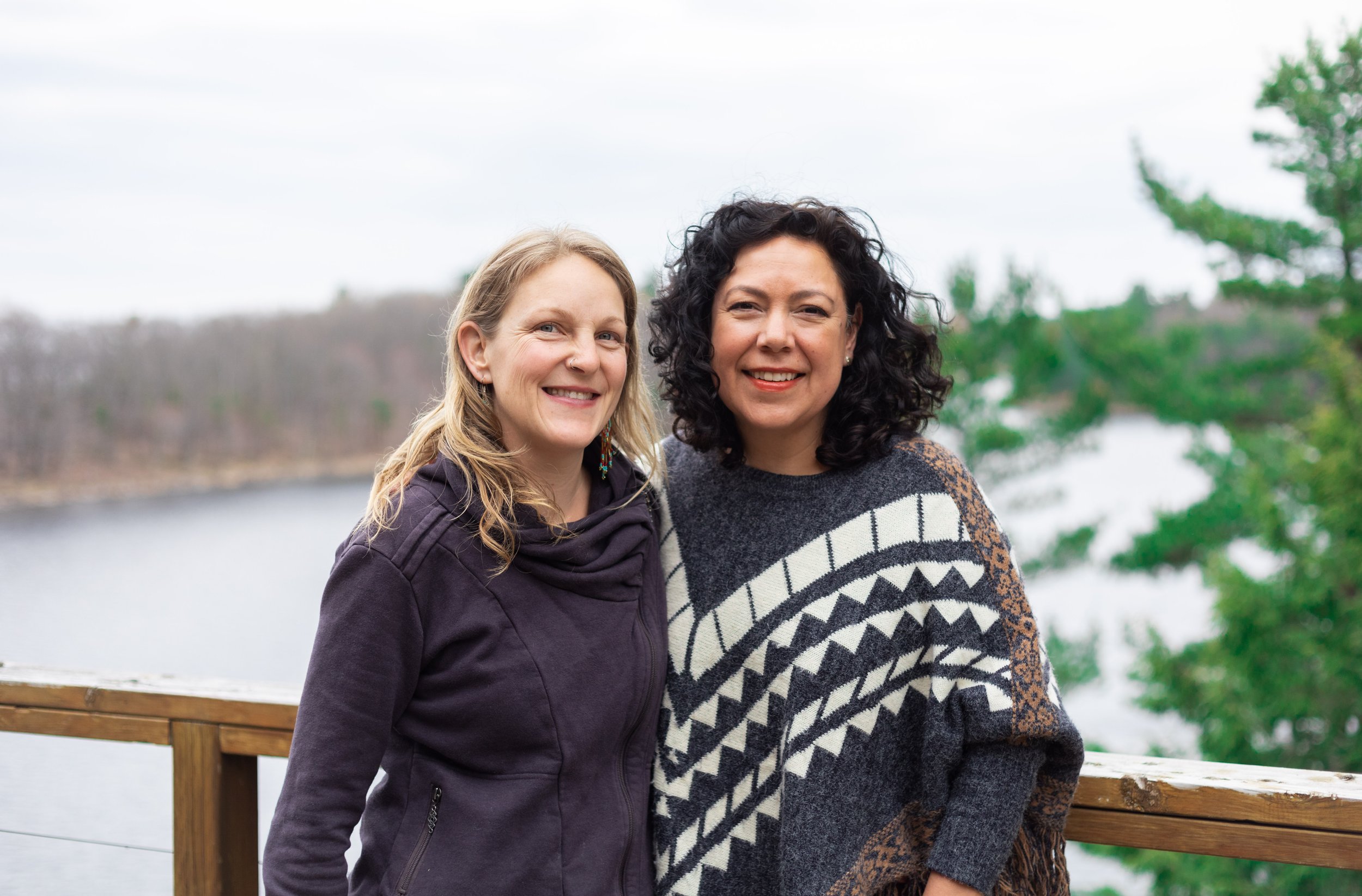
Jessica Kraitberg and Rebeka Tabobondung in Wasauksing. Photo by Sara Cornthwaite.
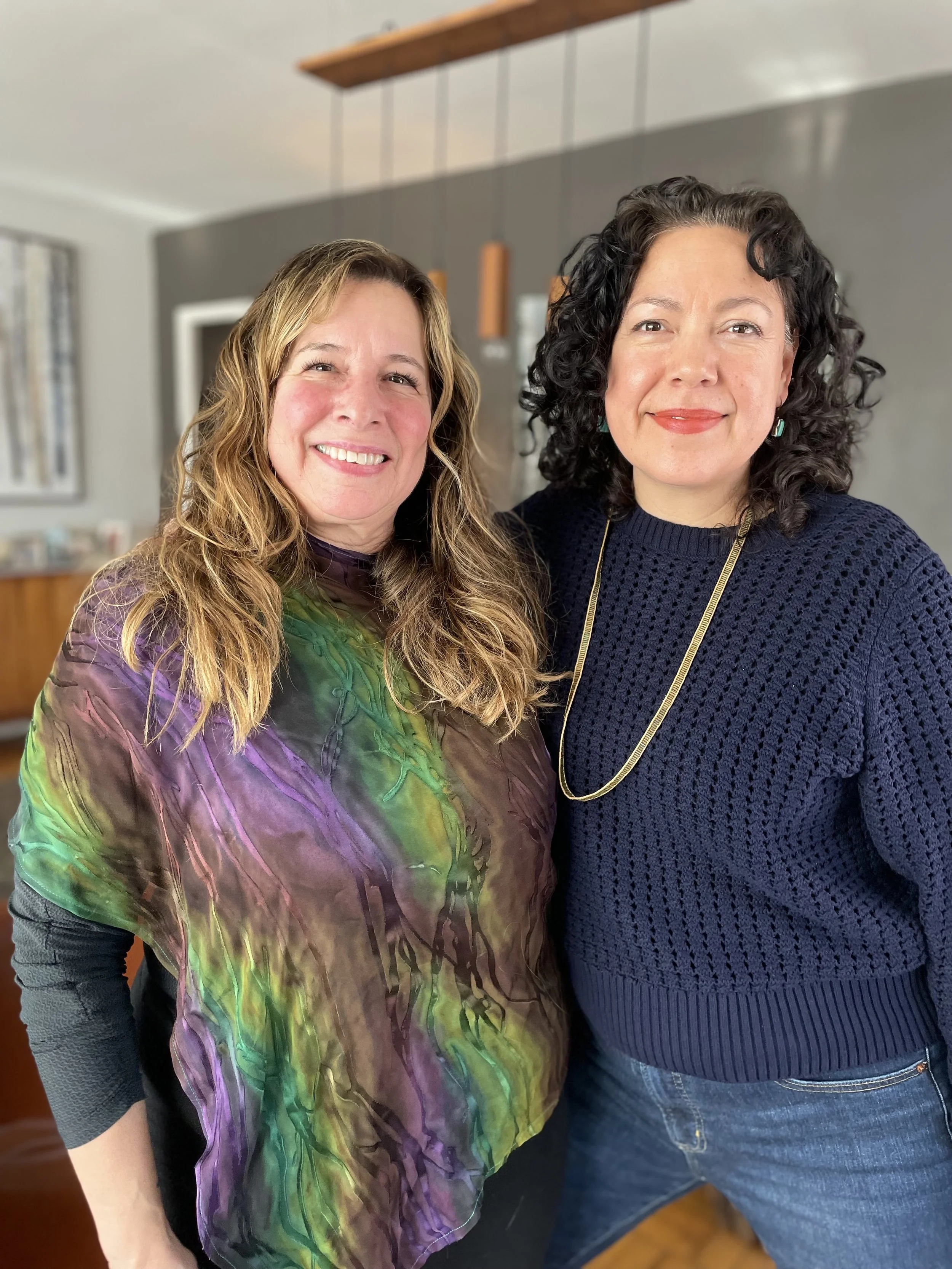
Ellen Blais and Rebeka Tabobondung in Toronto. Photo by Katerine Giguère.

Traditional Cree Midwife Jane Matthew (left) with her family in Chisasibi. Photo by Sara Cornthwaite.
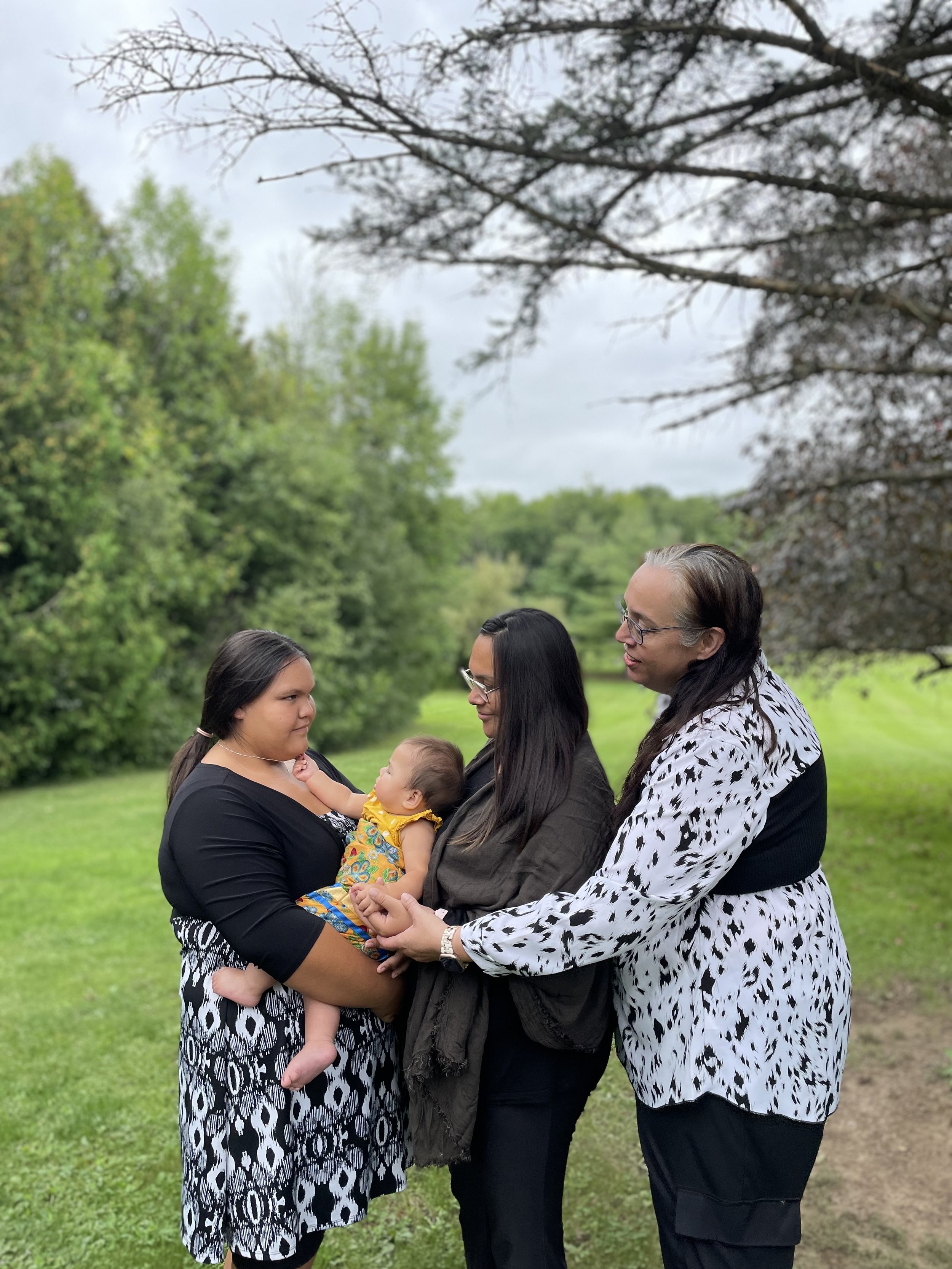
Four generations of women from a family in Six Nations. - Owerahwistos Doolittle (daughter) - Yakohwentsi:yo Ziah Clair Doolitle (baby) - Katsitsiohawi Hill (mother) - Phyllis Hill (grandmother and midwife)
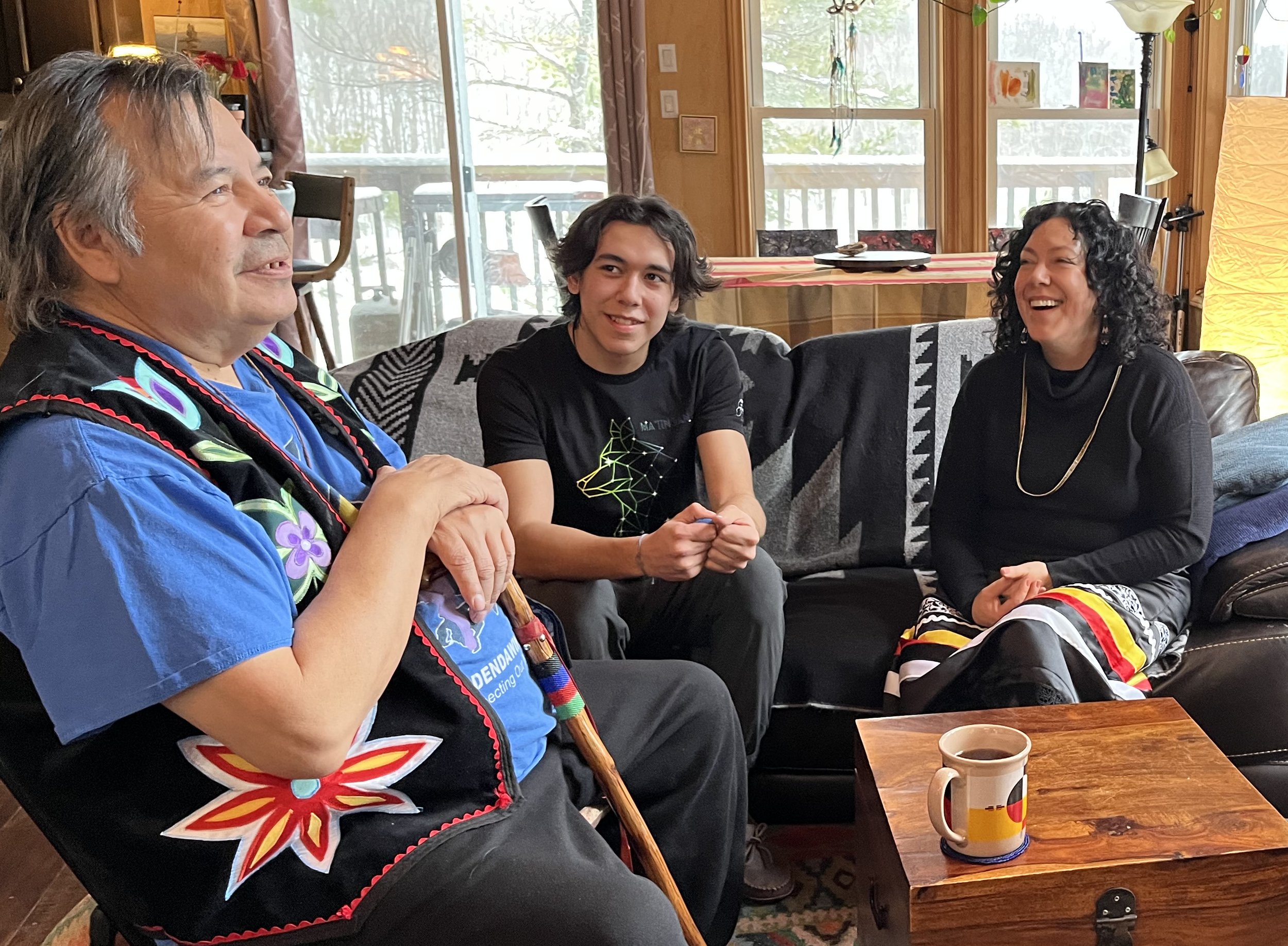
Hector Copegog (Anishinaabe Elder), Zeegwon Shilling (Rebeka’s son) and Rebeka Tabobondung in Wasauksing. Photo by Katerine Giguère.
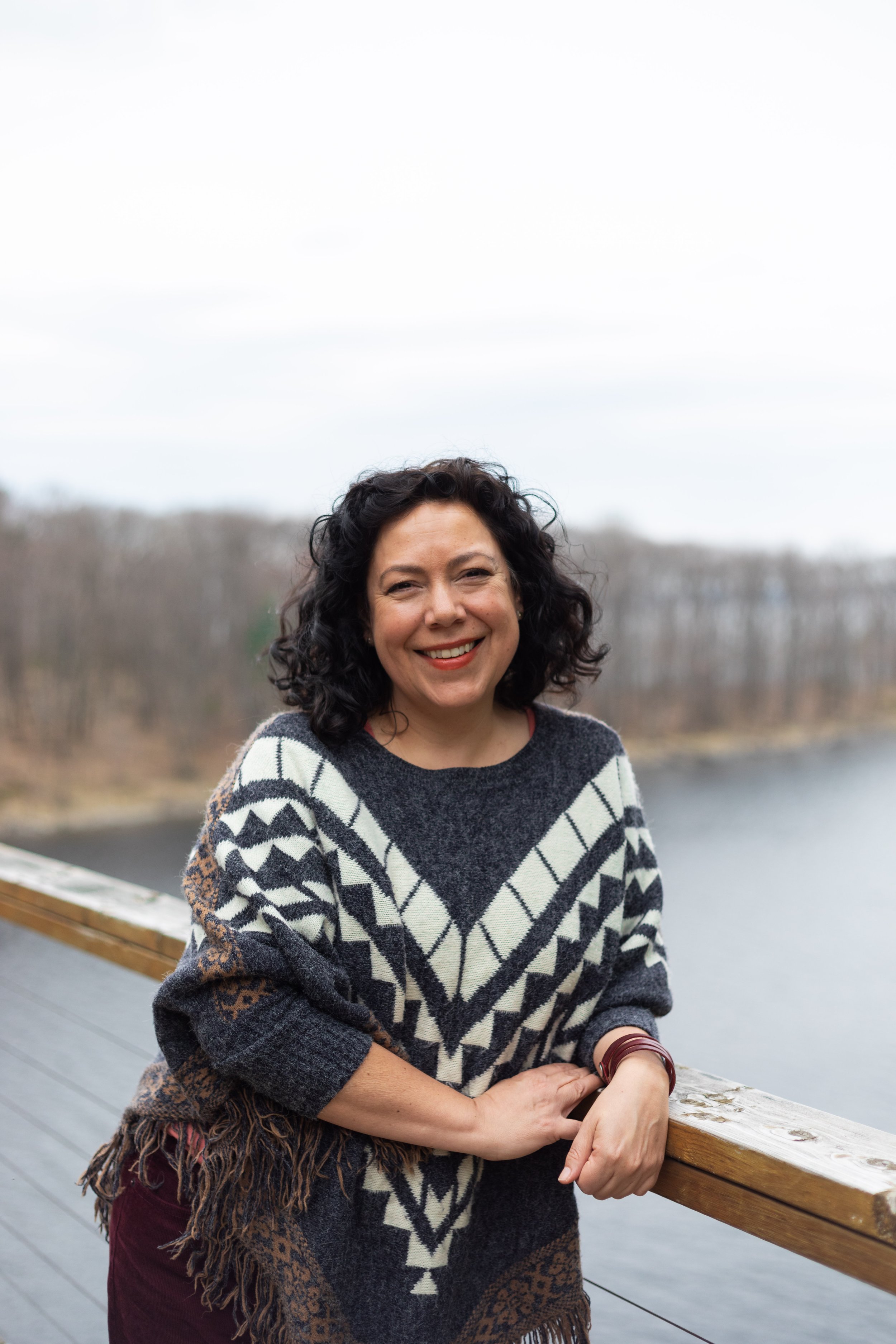
Rebeka Tabobondung in Wasauksing. Photo by Sara Cornthwaite.
Credits
Written, Directed and hosted by
REBEKA TABOBONDUNG
Execuive Producers
CATHERINE BAINBRIDGE
ERNEST WEBB
REBEKA TABOBONDUNG
PAUL CARRIÈRE
Producer
DANIEL MORIN
With the participation of:
ANTHONY JOHNSON
Midwifery Revitalization Project Coordinator
AKINISIE QUMALUK
Inuk Midwife
BRIANNA RUSHLOW |
SGMT Client, Matsqui First Nation
CAROL COUCHIE
Nishnawbekwe Nipissing First Nation Elder, Midwife
CHERYLLEE BOURGEOIS
Métis Midwife and Educator
CLAIRE DION FLETCHER
Patawatomi-Lenape Midwife and Assistant Professor TMU
COURTNEY MORNINGSTAR
Midwifery Client, Six Nations Birthing Center
CRYSTLE LIGHTNING
Cree Actress, Musician & Mother
EDITH CHISKAMISH
Mother, Chisasibi Community Member
EMMA BILODEAU
Kanien’kehá:ka Midwife
ELIZABETH BOBBISH
Aspiring Cree Midwife,Birth Home Coordinator
ELLEN BLAIS
Onkwehonwe Midwife, E.D. National Indigenous Council of Midwives
HANNAH BEARSKIN
Mother, Chisasibi Community Member
KENDRA PEGG
Métis Midwife
KIERA BRANT-BIRIOUKOV
SGMT Client, Kanien’kehá:ka
MARIA CAMPBELL
Métis Author & Elder
RACHEL DENNIS COUCHIE
Anishinaabe Midwife, K’Tigaaning Midwives
SARAIN FOX
SGMT Client, Anishinaabe Artist, Activist
SHANNON CHISKAMISH
Student Midwife
TEKATSi:TSIA'KWA (KATSI COOK)
Mohawk Elder and Midwife
ZEEGWON SHILLING (Rebeka’s son)
Anishinaabe singer and musician








